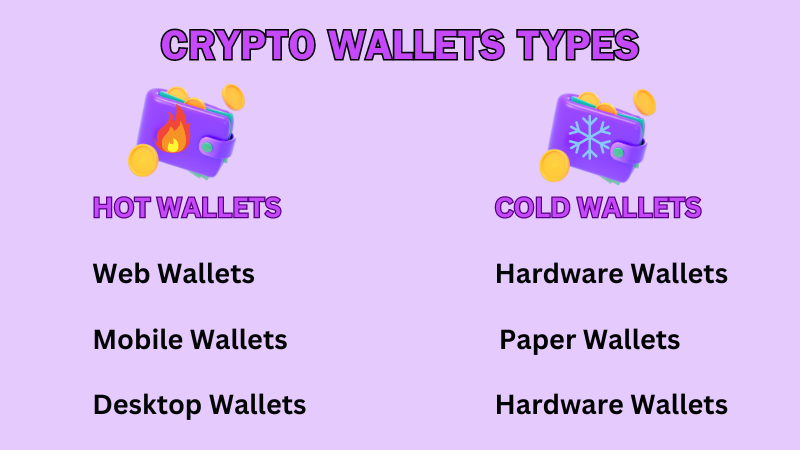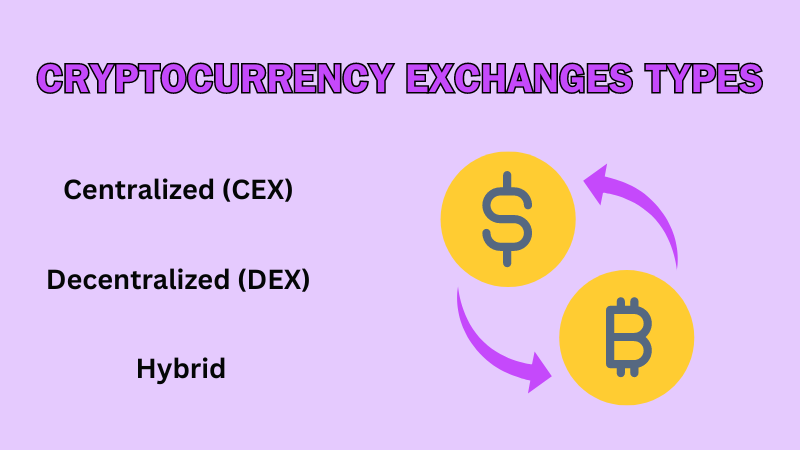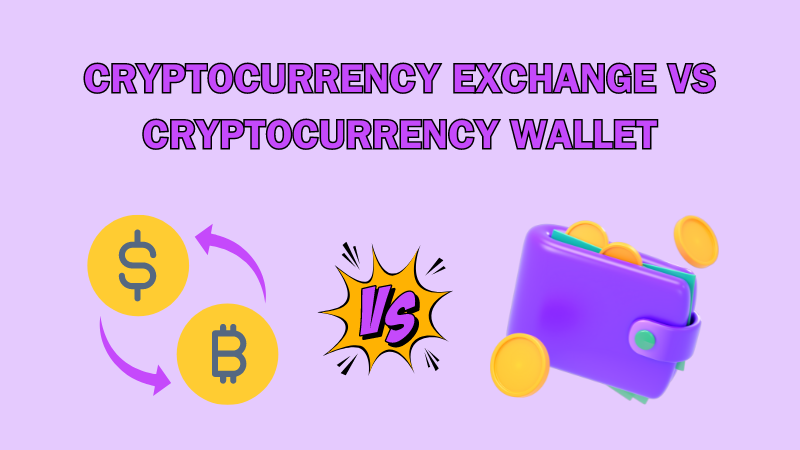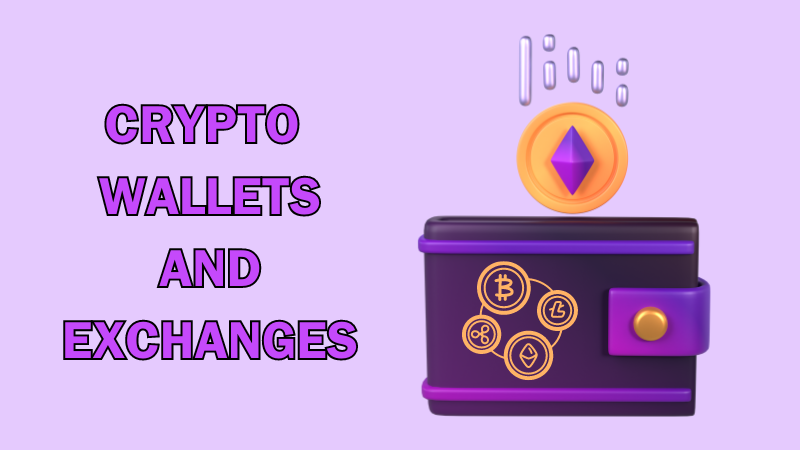Whether you’re new to the space or seeking to enhance your understanding, this guide will provide valuable insights into the types of crypto wallets and exchanges available, as well as essential tips for selecting reputable platforms.
Crypto Wallets
In this part, we provide you with a detailed explanation of crypto wallets.
What is a Crypto Wallet?
A cryptocurrency wallet is a digital tool used to store, manage, and interact with cryptocurrencies. It’s like a virtual wallet for your digital assets.
Instead of holding physical money, a crypto wallet holds your cryptographic keys, which are used to access and manage your cryptocurrency holdings on the blockchain.
Types of Crypto Wallets
There are various types of cryptocurrency wallets, each offering different levels of security and convenience:
Hot Wallets
Web Wallets
These are wallets accessed through a web browser, often provided by cryptocurrency exchanges or online wallet services. They are convenient for quick transactions but are vulnerable to hacking attacks targeting online platforms.
Mobile Wallets
These applications are installed on smartphones, allowing users to manage their cryptocurrencies. They are convenient for everyday use but can be compromised if the device is lost or hacked.
Desktop Wallets
These are software programs installed on computers, providing users with control over their private keys. While more secure than web or mobile wallets, they are still vulnerable to malware and hacking attempts if the computer is not adequately protected.

Cold Wallets
Hardware Wallets
These are physical devices, often resembling USB drives, designed to store cryptocurrency private keys offline. They are immune to online hacking attempts and are considered one of the most secure cryptocurrency storage methods. Ledger Nano X and Trezor Model T are popular examples.
Paper Wallets
These involve printing out private keys and QR codes on paper, keeping them completely offline. They provide excellent security since they are not connected to the internet, but they require careful handling to prevent loss or damage.
Custodial Wallets
Exchange Wallets
These are wallets provided by cryptocurrency exchanges to hold users’ assets. Users deposit their funds into wallets managed by the exchange, facilitating trading and withdrawals. While convenient, users relinquish control of their private keys, exposing them to the risk of exchange hacks or mismanagement.
Online Wallets
Some online services offer custodial wallet solutions, allowing users to store and manage their cryptocurrencies through a third-party platform. These wallets often provide additional features such as integrated exchange services or portfolio tracking.
Non-Custodial Wallets
Software Wallets
These are wallets where users have full control over their private keys. They can be desktop, mobile, or web-based applications. Examples include Electrum (desktop), Mycelium (mobile), and MetaMask (web). Users are responsible for securely storing and backing up their private keys.
Self-Hosted Wallets
These are non-custodial wallets where users run their own node to manage their cryptocurrency transactions. They offer maximum control and privacy but require technical expertise to set up and maintain.
Comparing the Types of Wallets
| Wallet Type | Security | Convenience | Examples |
| Hot Wallets | Convenient for everyday use, accessible online | Convenient for quick transactions | Web wallets, mobile wallets, desktop wallets |
| Cold Wallets | Immune to online hacking attempts | High security, especially for long-term storage | Ledger Nano X, Trezor Model T |
| Custodial Wallets | Easy access to funds, additional services | Provides convenience for users with managed custody | Exchange wallets, online wallets |
| Non-Custodial Wallets | Users have complete control over assets | Offers maximum security, users manage their own keys | Software wallets like Electrum, hardware wallets, paper wallets |
Choosing Crypto Wallet
When selecting a cryptocurrency wallet, consider these factors:
- Ensure the chosen wallet supports the cryptocurrencies you intend to store. Some wallets may only support popular cryptocurrencies like Bitcoin and Ethereum, while others may offer compatibility with a wider range of digital assets.
- Evaluate the user interface and experience of the wallet to ensure it is intuitive and easy to use. A well-designed interface can streamline the process of managing and transacting cryptocurrencies.
- Look for wallets that offer robust backup and recovery options. This includes features such as mnemonic phrases or seed phrases that allow users to recover their funds if they lose access to their wallet.
- Research the wallet’s reputation within the cryptocurrency community and consider feedback from other users. Opting for a wallet with a strong security and reliability track record can provide peace of mind.
- Check the development activity and frequency of updates for the wallet. Active development ensures that security vulnerabilities are addressed promptly and that the wallet remains compatible with the latest advancements in the cryptocurrency space.
- Consider any additional features the wallet offers, such as built-in exchange services, multi-signature support, or integration with hardware wallets. These features can enhance the functionality and usability of the wallet.
- If privacy and anonymity are priorities, look for wallets that prioritize these features, such as those offering support for privacy-focused cryptocurrencies or implementing features like CoinJoin for transaction anonymity.
- Be mindful of any associated costs and fees with using the wallet, such as transaction fees or subscription fees for premium features. Compare these costs against the features and benefits the wallet offers to determine its overall value proposition.
What Is Important When Choosing Crypto Wallet?
Choosing the right crypto wallet is crucial for safeguarding your digital assets. Here’s a rundown of factors to consider when making your decision:
- Choose a wallet with strong security features to safeguard your funds.
- Decide between hot wallets for frequent transactions or cold wallets for long-term storage.
- Ensure the wallet supports the cryptocurrencies you use.
- Opt for a wallet with an intuitive interface for easy navigation.
- Look for options to back up and restore your wallet in case of loss.
- Select a wallet with a solid reputation and ongoing development.
- Consider the wallet’s extra functionalities, such as exchange services or hardware wallet integration.
- If privacy is a concern, choose a wallet with privacy-focused features.
- Be mindful of associated costs and fees and compare them with the wallet’s features.
Crypto Exchanges
In this part, we provide you with a detailed explanation on crypto exchanges.
What is Crypto Exchange?
A crypto exchange is a website where people can buy, sell, or trade different cryptocurrencies. It’s like an online marketplace for digital money where buyers and sellers meet.
These exchanges help users find prices and make deals, making it easy to swap one cryptocurrency for another or trade them for regular money.
There are two main types of crypto exchanges: centralized exchanges (CEX) and decentralized exchanges (DEX). Each has its benefits.
People usually sign up for accounts on these platforms, put money in, and start trading, which helps keep the crypto market active and changing.
Types of Cryptocurrency Exchanges
Cryptocurrency exchanges come in different types for various trading needs and preferences:
Centralized (CEX)
Centralized Exchanges (CEX) are traditional platforms where users trade cryptocurrencies through an intermediary. These exchanges, like Binance and Coinbase, offer high liquidity, ease of use, and a centralized authority to manage transactions. However, they require users to trust the exchange with custody of their funds.

Decentralized (DEX)
Decentralized Exchanges (DEX) are platforms where users trade cryptocurrencies directly without a central authority. Operating on blockchain technology, DEX, such as Uniswap and SushiSwap, offer increased privacy, security, and user control over funds.
They eliminate the need for a central entity, promoting a trustless and censorship-resistant trading environment.
Hybrid
Hybrid exchanges combine features of Centralized and Decentralized platforms. They offer both liquidity and user control, aiming to balance the advantages of traditional and decentralized models.
Examples like IDEX and Kyber Network integrate centralized order books with decentralized settlement, compromising convenience and autonomy in crypto trading.
Choosing Crypto Exchange
Certainly, here’s a simplified chart comparing CEX, DEX, and hybrid exchanges:
| Aspect | Centralized Exchanges (CEX) | Decentralized Exchanges (DEX) | Hybrid Exchanges |
| Governance | Operated by a central authority or company | Operate on blockchain technology without a central authority | Combine features of CEX and DEX |
| Control | Users entrust funds to the exchange | Users retain control of their funds | May offer non-custodial options |
| Security | Vulnerable to hacking and theft | Greater security due to decentralized nature | Varies based on hybrid model |
| Liquidity | High liquidity due to centralized order matching | Liquidity may vary depending on platform | Liquidity may vary depending on platform |
| User Anonymity | User information may be required for KYC/AML compliance | Users can trade without disclosing personal information | Varies based on exchange policies |
| Trading Pairs | Typically offer a wide range of cryptocurrency and fiat pairs | Offer a variety of cryptocurrency trading pairs | Offer a mix of centralized and decentralized trading pairs |
| Performance | Fast transaction speeds and high throughput | Transaction speed may vary depending on blockchain congestion | Varies based on platform integration |
| Ease of Use | User-friendly interfaces and intuitive trading experience | Learning curve for decentralized platforms | Varies based on platform design |
What Is Important When Choosing a Crypto Exchange?
Several important factors should be considered when choosing a cryptocurrency exchange to ensure it meets your trading needs and provides a secure and reliable platform. Here are some key considerations:
Security
Security is paramount when selecting a crypto exchange. Look for platforms that implement robust security measures, such as two-factor authentication (2FA), cold storage for the majority of funds, encryption protocols, and regular security audits.
Reputation
Research the reputation of the exchange within the cryptocurrency community. Look for user reviews, ratings, and feedback on forums and social media platforms to gauge the reliability and trustworthiness of the exchange.
Regulation and Compliance
Consider whether the exchange complies with relevant regulations and has appropriate licenses in its operating jurisdictions. Regulated exchanges typically adhere to higher security and compliance standards.
Supported Cryptocurrencies
Ensure the exchange supports the cryptocurrencies you intend to trade. Some exchanges offer a wide range of digital assets, while others may have a more limited selection.
Liquidity
Liquidity is essential for efficient trading. Choose exchanges with high trading volumes and liquidity in the cryptocurrency pairs you want to ensure smooth order execution and minimal slippage.
Trading Fees
Be aware of the fee structure of the exchange, including trading fees, deposit and withdrawal fees, and any other applicable charges. Compare fees across different exchanges to find a platform that offers competitive rates.
User Interface and Experience
Consider the user interface and experience of the exchange. A user-friendly platform with intuitive navigation and responsive customer support can enhance your trading experience and reduce the likelihood of errors.
Payment Methods
Check the available payment methods for depositing and withdrawing funds on the exchange. Choose an exchange that supports convenient and secure payment options that align with your preferences.
Customer Support
Evaluate the quality and responsiveness of the exchange’s customer support team. Look for exchanges that offer multiple support channels, such as live chat, email, and phone support, to promptly address any issues or inquiries.
Geographical Restrictions
Some exchanges may have restrictions on users from certain countries or regions. Make sure the exchange is available in your location and complies with local regulations before signing up.
Cryptocurrency Exchange vs Cryptocurrency Wallet
A cryptocurrency exchange and a cryptocurrency wallet serve different purposes:
Cryptocurrency Wallet
A cryptocurrency wallet is a digital tool used to store, manage, and interact with cryptocurrencies. It is like a virtual wallet for your digital assets.
Instead of holding physical money, a crypto wallet holds your cryptographic keys, which are used to access and manage your cryptocurrency holdings on the blockchain.
There are different types of crypto wallets, including software wallets (apps or programs installed on devices like computers or smartphones), hardware wallets (physical devices designed for securely storing cryptocurrency keys offline), and paper wallets (physical documents containing your private keys and public addresses printed on paper).
Cryptocurrency wallets enable users to send and receive cryptocurrencies, view their transaction history, and manage their holdings securely.
Examples of cryptocurrency wallets include MetaMask (software wallet), Ledger Nano X (hardware wallet), and MyEtherWallet (software wallet).

Cryptocurrency Exchange
A cryptocurrency exchange is an online platform where users can buy, sell, or trade various cryptocurrencies. It functions as a marketplace for digital assets, facilitating transactions between buyers and sellers.
Exchanges provide services such as order matching, price discovery, and liquidity, allowing users to convert one cryptocurrency into another or exchange cryptocurrencies for fiat currency (traditional money like USD or EUR).
Users typically create accounts on exchanges, deposit funds, and engage in trading activities, contributing to the dynamic cryptocurrency market.
Examples of cryptocurrency exchanges include Binance, Coinbase, and Kraken.
Tips for Beginners – Crypto Wallets and Exchanges
Here are some tips for getting started with cryptocurrency wallets and exchanges:
- Educate Yourself. Take the time to educate yourself about blockchain technology, cryptocurrencies, and how exchanges and wallets function. Understanding the basics will help you make informed decisions and mitigate risks.
- Choose a Reputable Exchange. Select a well-established and reputable cryptocurrency exchange with a security and reliability track record. Research user reviews, ratings, and feedback to gauge the exchange’s reputation within the crypto community.
- Start with Small Investments. Begin with small investments until you become more familiar with the cryptocurrency market and trading dynamics. This will help you minimize potential losses while gaining experience.
- Practice Security Measures. Apply strong security measures to protect your funds and personal information. Use two-factor authentication (2FA), create complex passwords, and be cautious of phishing attempts and fraudulent schemes.
- Diversify Your Portfolio. Diversification is key to managing risk in cryptocurrency trading. Consider investing in various cryptocurrencies to spread risk across different assets and sectors.
- Understand Fees and Costs. Familiarize yourself with the fee structure of your chosen exchange, including trading fees, deposit and withdrawal fees, and any other applicable charges. Be mindful of fees, as they can impact your overall returns.
- Use a Secure Wallet. Choose a reputable and secure cryptocurrency wallet to store your digital assets. Consider security features, user interface, and compatibility with your preferred cryptocurrencies.
- Backup Your Wallet. Regularly backup your cryptocurrency wallet to ensure that you can recover your funds in case of loss or theft. Follow best practices for wallet security and backup procedures to protect your assets.
- Stay Informed. Stay updated on market trends, news, and developments in the cryptocurrency space. Follow reputable sources of information and engage with the crypto community to stay informed and make informed trading decisions.
Crypto Wallets and Exchanges Summary
When starting with crypto wallets and exchanges, prioritize security, choose reputable platforms, stay informed about market trends, and stay cautious when trading. Additionally, diversifying investments and understanding fees are important strategies for navigating the cryptocurrency landscape safely and effectively.
FAQ – Crypto Wallets and Exchanges
What are the risks associated with cryptocurrency exchanges❓
Risks include hacking, fraud, and regulatory uncertainty.
How do I ensure the security of my cryptocurrency wallet❓
Implement strong security measures such as using two-factor authentication (2FA) and backing up your wallet regularly.
Can I store all types of cryptocurrencies in one wallet❓
Some wallets support multiple cryptocurrencies, while others are designed for specific digital assets.
Are cryptocurrency transactions reversible❓
Cryptocurrency transactions are generally irreversible once confirmed on the blockchain.
What should I do if I lose access to my wallet❓
Follow the recovery process provided by your wallet provider and ensure you have backups of your private keys or recovery phrases.
Are there fees associated with using crypto wallets and exchanges❓
ees vary depending on the platform and type of transaction, including trading fees, withdrawal fees, and network fees.
